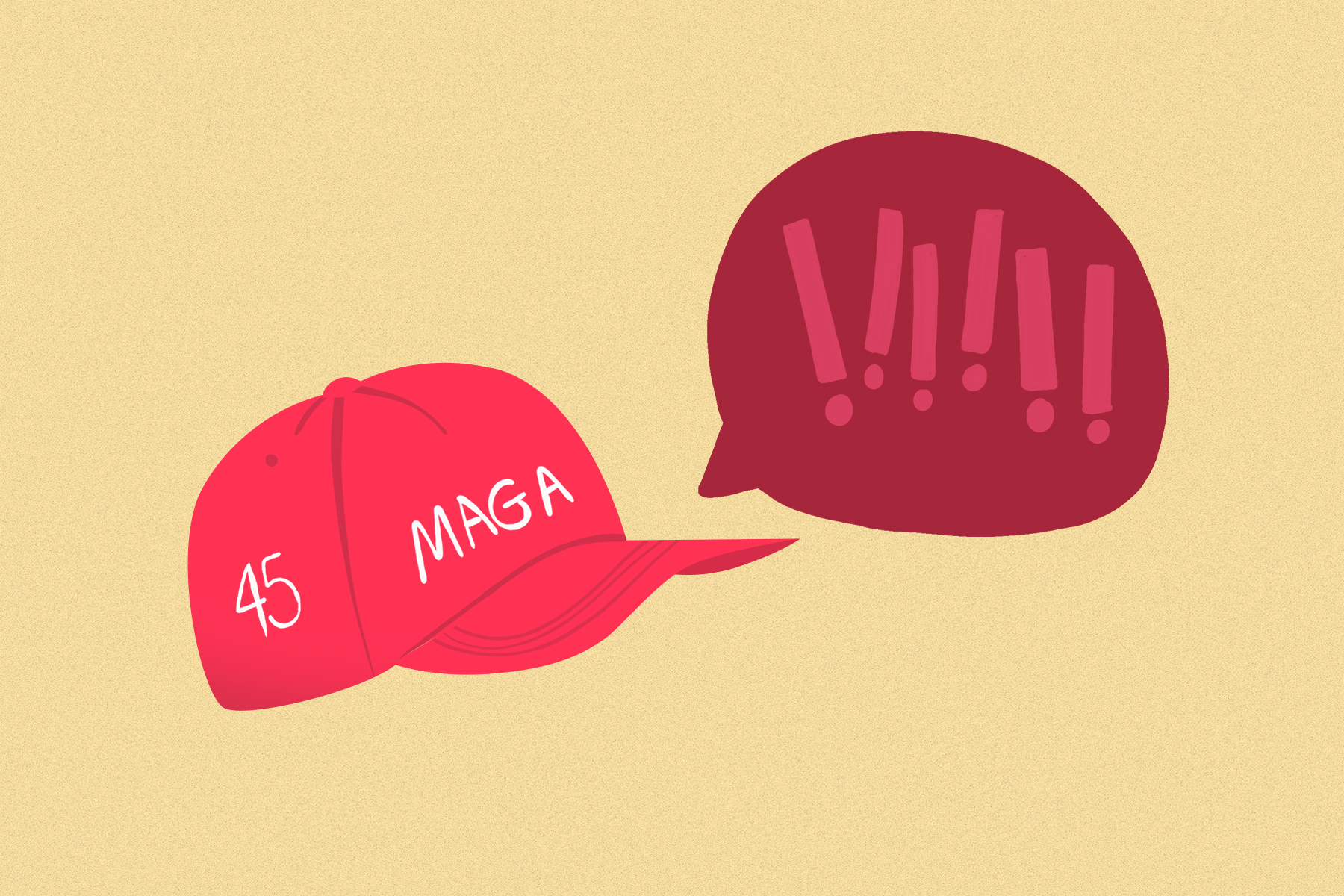If you have been anywhere on the internet since the presidential election, you’ve probably seen the word Parler either trending or mentioned in political posts. I first encountered it on Facebook, when a variety of politically active conservative people in my life mentioned leaving the platform to move to Parler, where they could express their political beliefs freely without alleged censorship. This left me with the lingering question: What is Parler?
A quick Google search showed me that Parler is a free speech oriented social media site — a sort of blend of Twitter and Facebook. That may not sound inherently bad, and in theory, it isn’t. People should feel free to share their thoughts and beliefs, as long as those thoughts and beliefs do not harm others. Unfortunately, Parler has become a breeding ground for baseless conspiracy theories and discriminatory posts that users release into the echo chamber of like-minded users.
Tina Nguyen wrote in Politico, “Hashtags on Parler denoting Trump’s favorite conspiracy theories — #Dominion, #Sharpiegate, #QAnon — trend freely, without the restrictions Twitter and Facebook have instituted to suppress them. Stories from fringe sites pushing baseless allegations of voter fraud are not flagged as disinformation, as they often are elsewhere. Videos from the Million MAGA March depicting heated confrontations between MAGA supporters, counterprotesters and D.C. police are shared as evidence of rampant antifa violence, omitting necessary context that would show otherwise.”
Nguyen touches on an important distinction — unlike Facebook and Twitter, which recently added flags to posts that they have fact-checked and proven false or dubious, Parler does not have any notifications marking untrue information. Therefore, posts without essential context or posts that are flagrantly misleading can exist on the site with no interference from the administrators.
Also, a federal appeals court rejected a lawsuit by conspiracy theorist Laura Loomer against Apple, Facebook, Google and Twitter for censoring conservative content, seemingly rendering Parler unnecessary, as the courts have ruled that censorship against conservative content is not a violation of the First Amendment and not politically motivated. This means the content is not taken down because it’s conservative, but because it violates the social media sites’ rules.
Parler does have some restrictions on what content users can post. It bans pornography and other sexually explicit or offensive content, but notably it doesn’t ban hate speech. You cannot post anything sexual on Parler, but you can freely use hate speech against marginalized groups. Porn is an interesting line to draw in the sand.
Most, if not all, other social media platforms have far stricter rules for content than Parler. “Indeed, Parler’s current rules for users, its Community Guidelines, are comparably lax to policies in place by competing platforms. Twitter, for example, prohibits users from misgendering others or treating anyone ‘less than human’ on the basis of age, disability or disease,” Andrew Blake wrote in the Washington Times.
While the Twitter rule leaves wiggle room for subjectivity on what content is “less than human” toward others, Parler makes no attempt to root out any content that dehumanizes people. The Twitter rules also offer more concrete specifications about what users may post, far more comprehensive than Parler’s. That is worrisome, particularly knowing what harmful conspiracy theories usually trend on the site.
Centering an entire social media platform around free speech is a challenge. Free speech tends to be a buzz word for conservative ideologists, adding a tinge of politicization to its existence. Matt Binder wrote in Mashable, “And Parler also faces unique challenges due to its politics. How do you keep your platform from turning into a white supremacist haven like other right-wing social media platforms without losing your ‘free speech’ bona fides? And, once you start moderating that content, what’s going to keep conservatives from leaving a platform that no longer prioritizes ‘free speech’?”
Binder’s questions are hard to answer. Gab, a similar free speech focused platform, was banned in 2018 after the Tree of Life shooting, as the shooter frequently posted violently anti-Semitic content on the site. If Parler faces a similar ghastly scenario, they will either have to enforce stricter rules or face a comparable shut down.
Violent attacks have not been linked to Parler, but other concerning actions have. Proud Boys leader Enrique Tarrio burned a Black Lives Matter banner on Parler, an action currently under investigation as a potential hate crime. A sheriff in Virginia was fired after posting multiple threatening messages on Parler against liberal politicians, judges and CEOs.
These are not the only clear examples of concerning rhetoric making its home on the site. “Parler allows usernames referencing the Atomwaffen Division’s violently anti-Semitic slogan, posts spreading the theory that Jews are descended from Satan, and hashtags such as ‘HitlerWasRight,’” wrote Alex Newhouse, the research lead at the Center on Terrorism, Extremism and Counterterrorism at Middlebury Institute of International Studies.
Antisemitism, while not illegal, is morally wrong, as is celebrating the success of the Holocaust with a frightening hashtag. None of this would be allowed on Twitter or Facebook.
Newhouse also noted that the QAnon conspiracy theory of blood libel, the false belief that Jewish people will kill innocent Christian people to use their blood for ritual purposes, spread across the Parler platform. He additionally highlighted a comment under one of Donald Trump Jr.’s posts, stating that “Civil war is the only way to drain the swamp.” That comment clearly encourages the starting of a rebellion to “drain the swamp” of Washington D.C., a statement President Trump used consistently in his campaigns to claim corruption in the government. Supporting massive violence because of the outcome of a democratic election is unacceptable and dangerous.
An integral piece of Parler’s problematic content is QAnon. Paul Murphy wrote in CNN, explaining QAnon, “Its main conspiracy theories claim dozens of politicians and A-list celebrities work in tandem with governments around the globe to engage in child sex abuse. Followers also believe there is a ‘deep state’ effort to annihilate President Donald Trump.”
These theories have no basis in reality and seem to only exist to justify already problematic beliefs. QAnon adapts with the times and continues to spurt forth theories about current events, like 5G cellular towers spreading COVID-19.
Facebook has taken steps to mitigate QAnon content on its platform. “Earlier this week, we stepped up how we enforce our rules against QAnon on pages, events, and groups. Starting today, we’re limiting the distribution of the ‘save our children’ hashtag given we’ve found that content tied to it is now associated with QAnon,” Facebook said in a statement.
While some use of the “save our children” hashtag is good, as human trafficking is a massive problem in the United States and must be addressed, QAnon coopted the hashtag to continue spreading the theory that politicians and celebrities are deeply involved in the trafficking of children without any evidence. While the Jeffrey Epstein scandal did expose some high profile alleged pedophiles, like Prince Andrew, the QAnon theory focuses almost exclusively on liberal celebrities with no clear backing.
Parler fosters a deeper divide in the political landscape of the United States, allowing its users to remain ensconced in their beliefs, instead of seeing a variety of viewpoints. It also offers alt-right and fringe conservatives a space to spread violent and hateful rhetoric. Hypothetically, a free speech based social media platform is not bad, but in practice, Parler has become a harmful and polarizing force that tugs at the loose threads of our democracy, which already rests on a tenuous precipice.

















